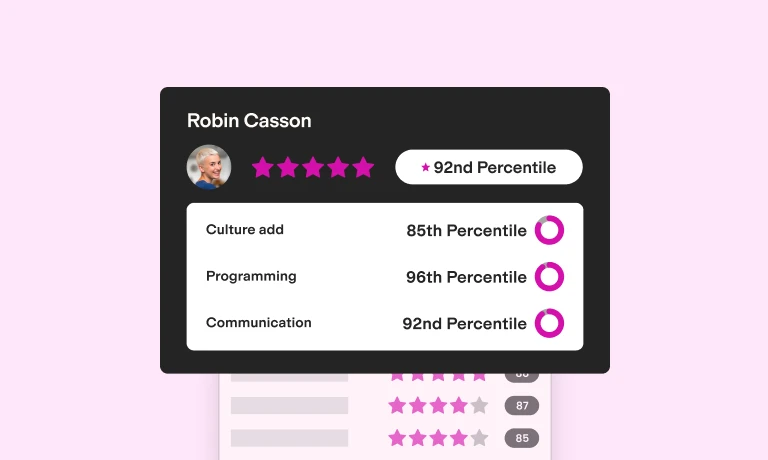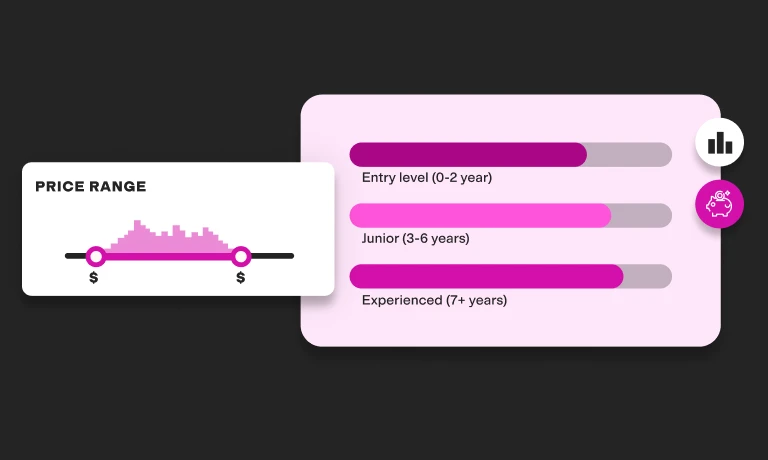The 16 Personalities test, based on the work of philosopher Carl Jung, categorizes human personality into 16 unique types based on four binaries: extraverted vs. introverted, sensing vs. intuitive, thinking vs. feeling, and judging vs. perceiving.
Results of the 16 Personalities test can reveal a lot about the test-taker – from their communication style and decision-making tendencies to their interpersonal relationships, career preferences, and suitability for specific jobs.
Of the 16 personality types, several stand out as “natural leaders.” But which ones are they, and what are they like in leadership positions?
Our guide breaks this down – and explains how integrating personality tests into your hiring process can ensure you find the right leaders for your company.
What makes a great leader?
There’s no one-size-fits-all approach to outstanding leadership. However, great leadership skills are a combination of traits and skills that help guide, inspire, and influence others.
Here are some of the core traits found in many successful leaders:
Vision: Great leaders know where they want to go, understand how they’ll get there, and can clearly explain this vision to others.
Integrity: Leaders with integrity are honest and moral. They build trust and set a standard for ethical behavior within their organization.
Empathy: Empathetic leaders can better connect with their team members and understand their needs and motivations.
Emotional intelligence: Leaders with high emotional intelligence can manage their own emotions and those of their team members. This allows them to build strong relationships with their team and handle difficult situations effectively.
Communication skills: A great leader must be able to communicate their vision, ideas, and expectations clearly and persuasively.
Decisiveness: A good leader can make decisions quickly and confidently, especially under pressure. This helps them move projects forward and address issues as they arise.
The ability to inspire: Great leaders inspire and motivate others, energizing their team and encouraging them to perform at their best.
Resilience: Resilient leaders can cope with challenges, learn from mistakes, and persist when things become tough.
Adaptability: The ability to adapt to changing situations and challenges is crucial in leadership. Similarly, effective leaders are flexible and open to new ideas and approaches.
Leaders will likely display these traits to different degrees, and different situations will require different leadership styles. The most effective leaders are those who can assess their team’s needs and adapt their leadership style to meet them.
16 Personalities types who make excellent leaders
Seven personality types from the 16 Personalities model are commonly considered strong leaders because they combine the traits we discussed above.
Like everyone, though, these personality types also have weaknesses you should consider.
Let’s break this all down below.
1. ENFJ: The energetic leader
ENFJs, also called Protagonists, are passionate leaders who know how to inspire their teams. Their high emotional intelligence helps them understand their team members’ feelings and work through difficult situations.
Additionally, Protagonists communicate in a way that motivates teams, especially when there’s a tight deadline. They ensure everyone focuses on the goal, which keeps the team proactive and working well together.
What to be mindful of
As leaders, Protagonists might care too much about what others think, making it hard to make tough decisions and address conflicts, even when necessary.
Because ENFJs are so tuned into others’ feelings, they might also get too involved in their team’s problems, which can overwhelm them.
2. ENFP: The motivational leader
ENFPs, known as Campaigners, are dynamic leaders who excel at motivating their teams with their energy and creativity. They’re great at thinking outside the box and encourage their team to do the same.
ENFPs are also excellent communicators, able to share their vision in an inspiring way, especially during challenging times.
What to be mindful of
Campaigners might struggle with consistency and following through on plans, as they're often excited about new ideas. Their dislike for routine tasks can lead to overlooking important details, too. They can also be overly optimistic, underestimating challenges or obstacles.
3. ENTJ: The commanding leader
ENTJs, otherwise called Commanders, are decisive and efficient leaders. They excel at setting goals, creating clear plans for what they want to achieve, and guiding their teams to success.
Individuals of this personality type are confident in their decisions and typically have little trouble achieving even the most ambitious objectives.
What to be mindful of
ENTJ leaders can sometimes be too forceful or impatient, which may intimidate their team members. They might also overlook others’ feelings or opinions if they’re too focused on their own goals. Additionally, their high standards can sometimes create a demanding work environment.
4. ENTP: The creative leader
ENTPs (aka Debaters) make innovative leaders, known for their quick thinking and flexibility. They thrive off the dynamic nature that leadership positions bring, and they enjoy thinking outside the box when solving problems.
Debaters also encourage their teams to share their ideas – no matter how unconventional they may be – freely, as they believe any idea has the potential to spark innovation.
What to be mindful of
In leadership positions, ENTPs may struggle with follow-through and can sometimes move on to the next project before finishing the current one. They might also find routine or detailed work uninteresting, which can sometimes push them to neglect necessary tasks.
5. INFJ: The insightful leader
INFJs, aka Advocates, lead with empathy and insight. They’re highly considerate of others’ feelings and are motivated by their teams’ shared values and visions. INFJs are also excellent at understanding complex emotional differences and creating a harmonious team dynamic.
What to be mindful of
As leaders, Advocates might become overwhelmed by too much conflict or negativity. They can be sensitive to criticism and may struggle with asserting themselves, too.
They also tend to be private, which can sometimes hinder open communication with their team.
6. INFP: The genuine leader
Honesty and integrity are the name of the game with INFP (or Mediator) leaders. They’re empathetic and understanding, often connecting with their team on a deeper level. INFPs also always look for the best in people and easily inspire others with their commitment to their values.
What to be mindful of
It can be tempting for INFP leaders to avoid conflicts and confrontations, which can lead to unresolved issues. They can take criticism personally and sometimes struggle with practical aspects of leadership. They also might have difficulty enforcing rules or deadlines.
7. INTP: The nontraditional leader
Also known as Logicians, INTPs are innovative and analytical leaders. They use these traits to question the causes of issues and identify potential ways forward. INTPs then guide their team toward innovative solutions, encouraging them to be creative and think outside the box.
What to be mindful of
INTPs are unique leaders who balance a love for innovation with a critical eye. They enjoy new ideas but can be too detail-oriented and critical when evaluating those ideas, sometimes forgetting to consider how their team feels.
Additionally, INTPs can sometimes find it hard to explain their ideas clearly, leading to misunderstandings. They also might resist routine, which can make it hard to keep plans and tasks organized.
The best insights on HR and recruitment, delivered to your inbox.
Biweekly updates. No spam. Unsubscribe any time.
Any personality type can shine in a leadership role
The charismatic, the decisive, the innovative – these are traits we often associate with great leaders. And while it’s true that the personality types we've just discussed bring remarkable strengths to leadership roles, they're not the only ones capable of shining in these positions.
The beauty of leadership lies in its diversity. Every personality type has the potential to become a great leader.
For example, ISFJs (aka Defenders) are seen as nurturing and detail-oriented. They can lead with the care and precision required for a supportive and efficient work environment. Also, ISTPs (aka Virtuosos) are known for their problem-solving skills and adaptability. They can easily navigate challenging situations and steer their team through complex projects – abilities any great leader would do well to have.
These examples show that the traditionally “quieter” or “softer” personalities can bring exactly what’s needed for leadership. It all depends on what you are looking for in a leader.
Use the 16 Personalities test as part of a comprehensive candidate assessment process
The 16 Personalities test can be a fantastic tool to evaluate candidates for leadership roles at your organization, but it shouldn’t be the only assessment you use.
At TestGorilla, we recommend adopting a multi-measure assessment approach to truly understand your candidates’ capabilities and fit for a leadership position.
Our platform provides an all-in-one solution to your hiring needs. We offer hundreds of expert-created and scientifically validated tests – including personality assessments (including 16 Personalities), role-specific tests, cognitive ability assessments, soft skills tests, and more.
Combine up to five tests for a custom assessment. This gives you a well-rounded view of each candidate's strengths, weaknesses, and suitability for the role – enabling you to always make a confident hiring decision.
Find your ideal leader with TestGorilla
Great leaders have a unique blend of traits and skills. From visionary and integrity-driven to those with high emotional intelligence and communication abilities, leaders can inspire and guide in various ways.
This diversity extends across all personality types, each bringing their strengths to leadership roles, from ENFJs’ empathy to ENTJs’ decisiveness. However, you’ll need to do more than merely understand these personality types to identify the right leader for your organization.
With TestGorilla, you can pair personality tests with various other talent assessments for a complete picture of what your candidates bring to the table and how they might fit into your company.
Interested in learning more about how TestGorilla can help you find the ideal leader for your team? Register for a quick demo, and sign up for a free plan today!
You've scrolled this far
Why not try TestGorilla for free, and see what happens when you put skills first.


















